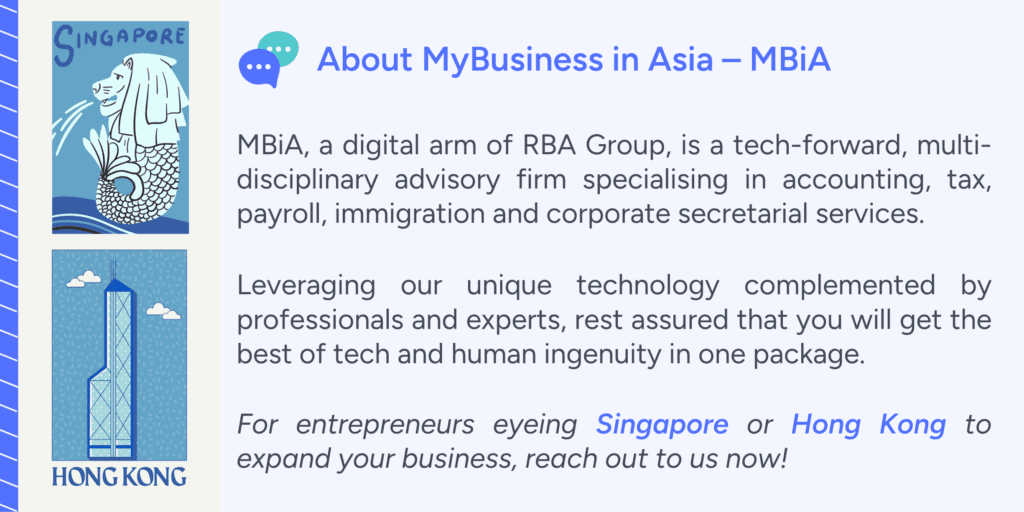 STARTING
STARTING
Starting my business in Singapore
Register your business with us here
Singapore enjoys a favourable economic environment and offers various grants and attractive financial incentives to businesses. Thus, a large number of multinational companies have chosen Singapore as a regional hub in Asia.
Benefiting from a stable political and regulatory, as well as an independent judiciary, the city-state continues every day to attract investors from around the world. Such an environment has enabled it to become one of the major global business centers.
A Singapore company is an excellent vehicle for development in almost all economic sectors: trade, advisory, portfolio holding companies, shareholding in investment projects, shipping companies, treasury centres, real estate, yachting and intellectual property management.
Use our digital services for your business here
Establishing a subsidiary in Singapore
Register your subsidiary with us here
A foreign company may incorporate a subsidiary in Singapore as a private company limited by shares of which the majority of shares are held by the foreign parent company. It is incorporated with limited liability and has a distinct legal identity. The foreign parent’s liability is limited to the value of the shares it has subscribed to in the subsidiary and may be the sole shareholder, owning 100% of the subsidiary’s shares. A Singapore subsidiary is entitled to local tax incentives. Depending on the structure of their shareholding, certain companies may pay zero tax on the first S$100,000 (pprox.. USD70,000) of chargeable income for the first three consecutive years after incorporation.
Setup Requirements for Singapore Subsidiary Company
- Minimum one Corporate Shareholder
- One Resident Director
- One Company Secretary
- Minimum initial paid-up capital is S$1
- A Singapore registered office address
Use our digital services for your Subsidiary here
Registration of a representative office in Singapore
A Singapore representative office (RO) is usually set up when a foreign company wishes to establish a presence in Singapore, but does not (yet) intend to conduct business there. A RO is primarily for non-commercial activities, including administrative activity. Under Singapore law, a RO is not a business entity and is not allowed to undertake any profit generating activities.
In order to register a Singapore RO, all applications must satisfy the following criteria:
- The foreign parent company must have annual sales turnover in excess of USD250,000; and
- Have been established for three years or more; and
- The proposed number of employees in the RO must be five or less.
The following documents are required to register a RO:
- Completed application;
- Copy of the parent’s Certificate of Incorporation or Registration Certificate;
- Copy of the parent’s latest annual report and audited accounts; and
- Duly endorsed undertaking to abide by the legislation and regulations governing the operation of RO in Singapore
- All documents must be in English or provided with an official English translation.
RBA can assist you in the registration of your RO in Singapore here
Registration of a local Singapore company
Register your local Singapore Company with us here
All Singapore businesses must be registered with the Accounting & Corporate Regulatory Authority (ACRA) of Singapore.
The Private Company Limited by Shares is the most popular business entity in Singapore.
It has a legal status independent from its shareholders and directors, who enjoy liability for the debts and losses of the company. A limited company has the legal capacity to enter contracts in its name, own property and sue and be sued. Its limited liability status is indicated by ‘Pte Ltd’ in its name.
Features of a Private Company Limited by Shares
- A legal entity separate and distinct from its shareholders and directors.
- It can sue or be sued in its own name.
- A minimum of one and a maximum of fifty shareholders.
- A subsidiary company, with at least one individual shareholder with minimum of 10% shareholding, is entitled to additional local tax incentives.
Singapore Company Registration Requirements for Singapore Private Company Limited by Shares
- Minimum one Shareholder
- One Resident Director
- One Company Secretary
- Minimum initial paid-up capital is S$1
- A Singapore registered office address
Use our digital services for your local Singapore Company here
Tax exemption schemes and rebates for companies
In an effort to support corporate start-ups, the Singapore tax authority has implemented a scheme offering sizable tax exemptions to resident companies. The two of the most common schemes are :
Tax Exemption for Qualifying Singapore Start-up Companies: qualifying new companies are given full exemption on the first S$100,000 normal chargeable income and a further 50% exemption on the next S$100,000 of normal chargeable income for the first three consecutive Yas. To qualify for tax exemption for start-ups, eligible companies must (i) be incorporated in Singapore, (ii) be a tax resident in Singapore and (iii) must not have more than 20 shareholders with at least one individual shareholder holding at least 10% of the issued ordinary shares of the company.
Partial Tax Exemption: eligible companies will enjoy a 75% exemption on the first S$10,000 of normal chargeable income and a further 50% on the next S$190,000 per YA.
Corporate Income Tax Rebate : a company is taxed at a flat rate of 17% on its chargeable income. However, resident companies will enjoy a 25% rebate of corporate income tax payable, subject to a cap of $15,000 per YA.
Use our digital services for your company’s taxation and administration here
RBA can assist you in complex tax structuring for your Company in Singapore here
Singapore limited liability partnership
A Limited Liability Partnership (LLP) is a perfect blend of a partnership with the benefits of private limited company.
An LLP gives its owners the flexibility of operating as a partnership, while having a separate legal identity similar to a private limited company. This type of entity is highly suitable for individuals engaged in professional services, including lawyers, architects, accountants and management consultants. Singapore citizens, residents, and employment pass holders can register a LLP. Foreign individuals and companies may also register an LLP but must appoint a local manager.
Features of an LLP
- It is a separate legal entity.
- Partners have limited liability.
- Minimum of two partners, no maximum limit.
- Partners can be individuals or a body corporate (company or other LLP).
Setup Requirements for a LLP
- Minimum two partners.
- Minimum one manager who must be a Singapore resident.
- A Singapore registered office address.
Tax and Singapore LLP
A Singapore LLP, is not directly subject to tax as it is not considered to be a corporate entity. Income from an LLP is taxed in the hands of the partners at their personal income tax rates. A corporate partner will be taxed at the applicable corporate tax rate.
RBA can assist you in the registration and administration of LLP in Singapore here
Singapore sole proprietorship
A Sole Proprietorship is the simplest form of business model with one individual or entity individually responsible for all the assets and liabilities of the business. Singapore citizens or permanent residents, holders of Employment Pass or EntrePass may register as a Sole Proprietor. Foreign individuals and companies may also register a Sole Proprietorship but must appoint a Singapore resident manager.
Features of a Sole Proprietorship
- It does not have a separate legal entity.
- The owner has unlimited liability.
- It cannot own property.
Requirements for a Sole Proprietorship
- Only one owner either corporate or an individual.
- A Singapore registered office address.
- For foreign individuals and companies only: minimum one manager who must be a Singapore resident.
Taxation of Singapore Sole Proprietorship
Singapore Sole Proprietorship, though tax resident, is not considered to be a corporate entity. Profit is taxed at the personal income tax rate of the owner.
RBA can assist you in the registration and administration of your Sole Proprietorship in Singapore here
STEP BY STEP GUIDES
Singapore company formation and business registration
Step 1: Name Reservation
The first step to set up a Singapore company, is to obtain name approval from the Singapore Registrar of Companies. Rosemont completes the application for name approval as part of the incorporation and registration service.
Name approval/rejection takes less than an hour, unless the proposed name includes regulated words including bank, finance, law, media, etc. that might require the review and approval of an external government authority, which may delay the name approval process by few days.
To increase the chances of receiving a quick name approval, the name should not:
- be identical or too similar to any existing local company names;
- infringe any existing tradenames;
- be obscene or vulgar; and
- be reserved already.
An approved name will be reserved for 60 days from the date of application. The name reservation can be extended by a further 60 days by filing an extension request before the expiry date.
Step 2: Register the Company
On receipt of name approval, the incorporation request can be filed and the Registrar of Companies approval can be obtained in a few hours. The incorporation procedure may be delayed if the authorities request additional information.
A registration fee of S$300 (approx. USD200) is payable to the Registrar of Companies on incorporation.
Supporting Documents
To incorporate, the following information is required by the Company Registrar:
- Company name;
- Brief description of the proposed business activity;
- Details of the shareholders, directors and company secretary;
- Address of the registered office
- Constitution. The Company Registrar provides standard Constitution document that is suitable for most companies.
MBIA will collect the following documents from you to prepare the incorporation documentation:
- For Non-Residents: Copy of passport, proof of overseas residential address and Know-Your-Client (KYC) information including bank reference letter, personal and business profile, etc.
- For Singapore Residents: Copy of Singapore identity card
- If the Shareholder is a corporate entity: Copy of registration documents including Certificate of Incorporation and Memorandum & Articles of Association.
Note that officially certified English translations must be provided of any documents that are not in English.
Incorporate with us
Post-Registration Formalities
Certificate of Incorporation
The Company Registrar will send an official email notification confirming the incorporation of the company. The email notification includes the company registration number and is treated as the official certificate of incorporation in Singapore. A hard copy of the certificate of incorporation is no longer issued by default, as it is not required in Singapore, but one can be obtained by an online request to the Company Registrar on payment of a fee of approximately S$50.
Company Business Profile
A business profile containing the particulars of the company can be obtained from the Company Registrar by an online request on payment of a small fee. Generally, the document (a PDF file) is available for download within an hour of the request and contains the following key details:
- Company name and registration number;
- Previous names of the company, if any;
- Incorporation date;
- Principal activities;
- Paid-up capital;
- Registered office address;
- Details of the shareholders, directors and company secretary;
- The email notification of incorporation and company business profile are sufficient evidence of the legal status of the company in Singapore for all legal and contractual purposes, including the opening of corporate bank accounts, signing a lease for business premises, subscribing to telephone/internet services, etc.
Other items that will be required upon registration of the Singapore company include:
- Share certificates for each of the shareholders;
- Share register recording share allocation;
- Company seal; and
- A rubber stamp for the company.
Incorporate with us
Opening a Corporate Bank Account in Singapore
After registration of a Company in Singapore a corporate bank account can be opened with any of the major banks in Singapore. Many banks will require the physical presence of the company’s principals as part of the account opening procedure.
If unable to visit Singapore, MBIA can suggest banks that will open a corporate bank account without a meeting in Singapore;
If the principals are able to visit Singapore, there is a greater choice of banks and the facilities they provide to enable the principals to choose the bank best suited to the needs of the company.
Incorporate with us here
Transfer your business to us here
RBA can assist with complex bank account opening and structuring see more
Licences in Singapore
Depending on the company’s activity, it may require one or more licenses after incorporation before commencing its activity if it operates a restaurant, an educational institute, travel agency, financial services, import/export of goods, etc.
Incorporate with us here
Transfer your business to us here
RBA can assist you in your license application see more
Applying for Goods and Services Tax (GST) Registration
Goods and Service Tax (GST) registration in Singapore
If the projected annual revenue of the company exceeds SGD 1 million (approx. USD700,000), the company must register for GST. GST, also known as Value Added Tax (VAT) or Sales Tax, is currently charged at 7% on the supply of goods and services. GST registration is not mandatory if the annual turnover is less than S$1 million.
Incorporate with us here
Transfer your business to us here


